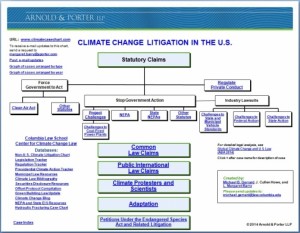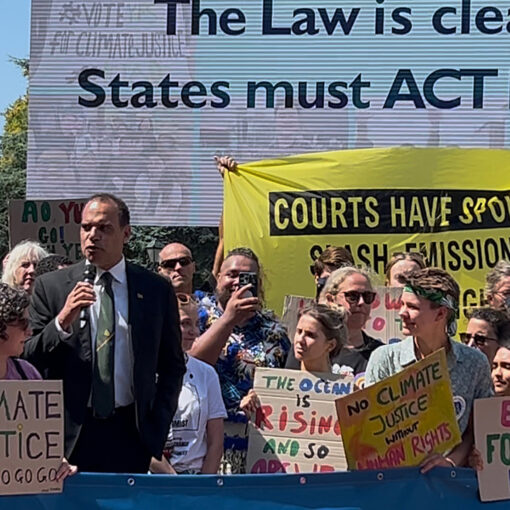Each month, Arnold & Porter and the Sabin Center for Climate Change Law collect and summarize developments in climate-related litigation, which we also add to our U.S. and non-U.S. climate litigation charts. If you know of any cases we have missed, please email us at columbiaclimate at gmail dot com.
Additions to the U.S. Climate Case Chart since Update #69
FEATURED DECISION
California Appellate Court Ruled That Environmental Review of Landfill Expansion Was Adequate. The California Court of Appeal reversed a trial court and ruled that an environmental impact report (EIR) for a proposed landfill expansion was adequate, including the EIR’s consideration of climate change-related impacts. The case concerned the 420-acre Redwood Landfill in Marin County, which accepts most of the county’s solid waste. The appellate court found that the EIR did not improperly defer mitigation of projected sea-level rise. The court said that, given uncertainty regarding the timing and extent of sea-level rise, the measures required by the EIR were “specific enough” to address potential future impacts. The appellate court also concluded that the EIR sufficiently analyzed cumulative greenhouse gas emissions. The court said that the California Environmental Quality Act did not mandate that the EIR analyze all methane-producing landfills or the cumulative impacts of all “related projects” on greenhouse gas emissions. In addition, the appellate court found that substantial evidence supported methods used to estimate landfill gas emissions and that the EIR properly offset an increase in greenhouse gas emissions with a reduction of greenhouse gas emissions due to the use of engines fired by landfill gas. No Wetlands Landfill Expansion v. County of Marin, No. A137459 (Cal. Ct. App. Dec. 12, 2014): added to the “State NEPAs” slide.
DECISIONS AND SETTLEMENTS
Sierra Club and Energy Company Reached Agreement Regarding Attorney Fees Award. The District of Delaware bankruptcy court approved a settlement agreement between Sierra Club and Energy Future Holdings Corporation (EFHC) and related entities. The agreement resolved a number of pending litigation proceedings, including a $6.45-million attorney fees award against Sierra Club. The fee award was ordered by a Texas federal district court after Sierra Club unsuccessfully pursued a Clean Air Act citizen suit related to a coal-fired power plant located in Texas. In return for EFHC’s abandonment of its claim to the fee award, Sierra Club agreed to withdraw and release certain pending and threatened litigation concerning coal-fired plants run by EFHC and its affiliates and to withdraw certain Freedom of Information Act requests. EFHC agreed not to oppose Sierra Club’s motion to intervene in a pending New Source Review case brought by the United States concerning two Texas power plants, but Sierra Club agreed to restrictions on the scope of its intervention. In re Energy Future Holdings Corp., No. 14-10979 (Bankr. D. Del. order approving settlement Dec. 17, 2014; EFHC motion regarding settlement agreement Nov. 24, 2014): added to the “Challenges to Coal-Fired Plants” slide.
District Court Ruled on Motion to Amend in Remanded Challenge to California’s Low Carbon Fuel Standard. The district court for the Eastern District of California granted in part and denied in part a motion by plaintiffs to amend their complaint in their constitutional challenge to California’s Low Carbon Fuel Standard (LCFS). The court will be addressing the remaining pieces of this challenge after the Ninth Circuit Court of Appeals largely rejected the contention that the LCFS violated the dormant Commerce Clause. The court rejected the request to amend claims of extraterritorial regulation in violation of the Commerce Clause as well as a claim of a violation of principles of interstate federalism embodied in the Constitution (plaintiffs called this latter theory their “horizontal federalism claim”). The court said the Ninth Circuit resolved any claim premised on extraterritorial regulation when it explicitly held that the LCFS did not regulate conduct outside California. The district court also found that the law of the case barred plaintiffs’ claim that the LCFS’s ethanol provisions facially discriminated. The court found, however, that law of the case did not bar the claim of discrimination in purpose and effect since the Ninth Circuit did not reach that issue. The court also held as a matter of law that the LCFS did not implicate the Import-Export Clause because it did not provide for anything that reasonably could be construed as a tax; the court therefore denied plaintiffs’ request to add a claim of impermissible discrimination in violation of the Import-Export Clause. The court granted leave to amend to challenge 2012 amendments to the LCFS crude oil provisions and to drop federal preemption and “Pike balancing” claims under the dormant Commerce Clause. Rocky Mountain Farmers Union v. Goldstene, No. 1:09-cv-02234 (E.D. Cal. Dec. 10, 2014): added to the “Challenges to State Action” slide.
Federal Court Ruled That Qualitative Analysis of Logging Plan’s Carbon Storage Impacts Was Sufficient. The federal district court for the District of Oregon issued a mixed ruling in a challenge to the Snow Basin Vegetation Management Project, which would authorize a certain amount of commercial logging of large trees and old forests in the Wallowa Whitman National Forest in northeastern Oregon. Although the court ruled for the plaintiffs on several claims under the National Environmental Policy Act (NEPA), the court ruled for the federal defendants on the climate change-related NEPA claim. In particular, the court rejected the plaintiffs’ argument that the United States Forest Service had failed to disclose the short-term negative impact that the project would have on the forest’s capacity to store carbon. The court found that the agency’s qualitative analysis of the project’s long-term benefits with respect to climate change was sufficient. The analysis had noted there was uncertainty regarding carbon sequestration’s relationship to climate change and that the project was consistent with the Intergovernmental Panel on Climate Change’s recommendations for forest management. League of Wilderness Defenders/Blue Mountains Biodiversity Project v. Connaughton, No. 3:12-cv-02271 (D. Or. Dec. 9, 2014): added to the “Stop Government Action/NEPA” slide.
Supreme Court Declined to Hear Federal Public Trust Doctrine Case. The U.S. Supreme Court denied certiorari to petitioners who sought review of the D.C. Circuit’s holding that the public trust doctrine is a matter of state law. The petitioners had argued that the public trust doctrine compelled the federal government to take actions to reduce greenhouse gas emissions. Alec L. v. McCarthy, No. 14-405 (U.S. cert. denied Dec. 8, 2014): added to the “Common Law Claims” slide.
California Appellate Court Upheld CEQA Review of Mine in Fresno County. The California Court of Appeal affirmed the denial of a challenge to Fresno County’s approval of an aggregate mine. The mine, along with associated processing facilities, is planned for a 1,500-acre site in the Sierra Nevada foothills. The court rejected claims that the project’s environmental impact report (EIR) prepared under the California Environmental Quality Act (CEQA) was inadequate. Among the rejected contentions was the petitioner’s argument against the EIR’s assertion that the project would supply construction materials to satisfy “tremendous unmet need for aggregate in Fresno County.” The EIR said the project would result in a reduction of vehicle miles traveled and reduce greenhouse gas emissions because the project’s customers would otherwise have to travel approximately 120 miles to obtain the materials. The court found that substantial evidence supported the EIR’s conclusions. Friends of the Kings River v. County of Fresno, No. F068818 (Cal. Ct. App. Dec. 8, 2014): added to the “State NEPAs” slide.
Appeals Board Dismissed Challenge to Underground Injection Control Permit for Carbon Capture and Sequestration Project. The EPA Environmental Appeals Board (EAB) dismissed a challenge to an underground injection control permit issued for carbon capture and sequestration. The petitioner had filed a voluntary notice of dismissal after EPA sought to dismiss the petition on the ground that it was not timely. The petition argued that EPA had violated the Endangered Species Act by failing to consult with the U.S. Fish and Wildlife Service and that EPA failed to include provisions in the permit that would properly compensate Illinois property owners to whose “pore space” the carbon dioxide migrates. The petition also contended that EPA should have provided the public with access to proprietary software to verify modeling results, that EPA did not address air quality impacts, and that the permit’s rock sampling requirements would not provide a high degree of confidence in predictions of the carbon dioxide plume’s behavior. In re Archer Daniels Midland Co., UIC Appeal No. 14-72 (EAB Nov. 26, 2014): added to the “Stop Government Action/Project Challenges” slide.
New York Court Ruled Against Homeowners in Negligence Action Arising from 2011 Flooding. A New York Supreme Court in Staten Island awarded summary judgment to the City of New York and the New York City Department of Environmental Protection in an action by Staten Island homeowners who alleged that the City’s negligence resulted in flooding that damaged their car and their residence in August 2011. The court took judicial notice of climatological reports from the National Climatic Center and found that these reports proved that New York City had been “subjected to inordinate rainfall” during two storms in August 2011 (one of which was Hurricane Irene). The court found that the evidence demonstrated that the Staten Island sewer system had not been designed to accommodate the volume of rain that fell during the storms, and that the City met its burden of demonstrating prima facie that the sole proximate cause of the flooding was the volume of precipitation, not the City’s inspection and maintenance failures. Wohl v. City of New York, No. 103095/2012 (N.Y. Sup. Ct. Oct. 22, 2014): added to the “Adaptation” slide.
NEW CASES, MOTIONS, AND NOTICES
San Diego Association of Governments Sought California Supreme Court Review of Decision on Regional Transportation Plan. The San Diego Association of Governments (SANDAG) filed a petition for review in the California Supreme Court of an appellate court decision that held that SANDAG violated the California Environmental Quality Act (CEQA) when it approved a regional transportation plan. The appellate court said that SANDAG’s CEQA review should have included an analysis of the plan’s consistency with the greenhouse gas emissions reduction targets set forth in Governor Arnold Schwarzenegger’s Executive Order S-3-05. Cleveland National Forest Foundation v. San Diego Association of Governments, No. S223603 (Cal., petition for review filed Jan. 6, 2015): added to the “State NEPAs” slide.
FOIA Lawsuit Filed to Obtain Records About Availability of Data for Carbon Capture and Storage Facility. The Energy & Environment Legal Institute and the Free Market Environmental Law Clinic filed a lawsuit in the federal district court for the District of Columbia seeking documents from the U.S. Department of Energy (DOE) concerning a carbon capture and storage (CCS) facility in Mississippi. The plaintiffs submitted their Freedom of Information Act (FOIA) request for documents to DOE in November 2014. They requested a “cooperative research and development agreement” for the Kemper County Energy Facility, a flagship demonstration project for CCS that the U.S. Environmental Protection Agency cited in its existing power plants greenhouse gas rulemaking as an example of a facility where CCS has been “adequately demonstrated.” The plaintiffs said that the agreement reveals when the U.S. government will receive technical and cost data for the project, which the complaint says “is still not fully operational and presently $4 billion over budget.” Energy & Environment Legal Institute v. U.S. Department of Energy, No. 15-cv-007 (D.D.C., filed Jan. 5, 2015): added to the “Force Government to Act/FOIA” slide.
D.C. Circuit Allowed EPA Additional Time to Consider Air Standards for Oil and Gas Sector. EPA requested, and received, a continued stay of the proceeding challenging its 2012 new source performance standards (NSPS) for the oil and gas sector. EPA asked for the additional time so that it could further consider comments it received on technical white papers regarding control of methane emissions from the oil and gas sector. The white papers were released in April 2014 as a component of President Obama’s March 2014 strategy to address methane emissions. EPA also said it was working to finalize time-sensitive implementation measures for the NSPS. The parties to the proceeding must file motions to govern further proceedings by January 30, 2015. American Petroleum Institute v. EPA, No. 13-1108 (D.C. Cir., clerk order granting mot. to continue stay Dec. 17, 2014): added to the “Challenges to Federal Action” slide.
New Jersey City Sought to Enjoin Construction of Dune System on Its Beaches. The City of Margate, New Jersey commenced a lawsuit against the U.S. Army Corps of Engineers and the New Jersey Department of Environmental Protection (NJDEP) to prevent the agencies from commencing a sand dune construction project on the City’s beaches. The City claimed that implementation of the project would violate the U.S. and New Jersey constitutions, would constitute a trespass, and would violate New Jersey law. The complaint also alleged that NJDEP had failed to comply with the requirements of New Jersey’s Eminent Domain Act of 1971. Margate City, New Jersey v. United States Army Corps of Engineers, No. 1:14-cv-07303 (D.N.J., filed Nov. 24, 2014): added to the “Adaptation” slide.
Organizations Filed Notices of Intent to Sue EPA About Delays in Renewable Fuel Standards. In November and December 2014, EPA received four letters from two organizations notifying the agency of intent to file lawsuits to compel EPA to issue biomass-based diesel and renewable fuel requirements for 2014 and 2015. One organization, the American Fuel & Petrochemical Manufacturers (AFPM), said that “EPA’s track record has become an egregious pattern of statutory non-compliance.” The American Petroleum Institute (API) included a table in its letter that listed EPA’s delays since 2010 in determining annual renewable fuel requirements. API also indicated that it also planned to sue to require EPA to respond to a 2013 waiver application. API, Notice of Intent To File Citizen Suit (Dec. 15, 2014); AFPM, Notice of Intent to File Suit for Failure to Issue the 2015 Renewable Fuel Standard Regulations (Dec. 1, 2014); API, Notice of Intent to File Citizen Suit (Dec. 1, 2014); AFPM, Notice of Intent to File Suit for Failure to Issue the 2014 Renewable Fuel Standard Regulations (Nov. 21, 2014): added to the “Challenges to Federal Action” slide.
Lawsuit Alleged NEPA Violations in Approvals of Offshore Drilling Permits Off California Coast. The Environmental Defense Center (EDC) filed a lawsuit in the federal district court for the Central District of California alleging that federal agencies and officials failed to comply with NEPA when they approved 51 Applications for Permits to Drill and Applications for Permits to Modify for offshore drilling. EDC alleged that the permits would facilitate oil and gas development and production in federal waters off California’s coast and would authorize well stimulation such as acid well stimulation and hydraulic fracturing. EDC said that the Bureau of Safety and Environmental Enforcement improperly relied on categorical exclusions or no written NEPA documentation at all in making its determinations on these permits. Among the environmental risks enumerated in the complaint are increased greenhouse gas emissions. Environmental Defense Center v. Bureau of Safety and Environmental Enforcement, No. 2:14-cv-09281 (C.D. Cal., filed Dec. 3, 2014): added to the “Stop Government Action/NEPA” slide.
Lawsuit Filed to Challenge Natural Gas-Fired Power Plant in Massachusetts. On November 28, 2014, four individuals filed a petition in the First Circuit Court of Appeals seeking review of air permits issued by the Massachusetts Department of Environmental Protection for a natural gas-fired power plant. The facility is located in Salem, Massachusetts. The EPA Environmental Appeals Board previously denied review of the permits. Brooks v. EPA, No. 14-2252 (1st Cir., filed Nov. 28, 2014): added to the “Stop Government Action/Project Challenges” slide.
Recent additions to the Non-U.S. Climate Litigation Chart
In United Kingdom, administrative court upholds planning board’s rejection of wind turbine project on the basis of its detrimental effect on the historic landscape and visual impact. A local planning authority in Wales denied an application to construct 3 wind turbine generators in a Historic Landscape Area, and the applicant appealed. The administrative court found that the proposed wind turbines would have a significantly detrimental effect on the historic landscape and would detract from the enjoyment of visitors to the area. The court also found, however, that the local community was involved in the development of the wind project and that the turbines would make an important contribution towards the United Kingdom’s efforts to combat climate change. After weighing these considerations and concluding that the emissions reductions benefits were outweighed by “the significant harm that would be caused to the historic landscape and visual amenity of the common,” the administrative court dismissed the appeal. Bellis v. Merthyr Tydfil CBC (United Kingdom, Planning Inspectorate [2014] P.A.D. 50) – Added to “Renewable Projects” slide.





